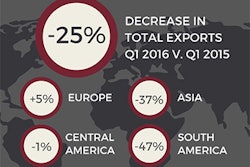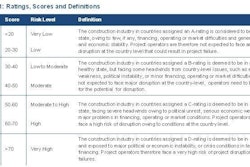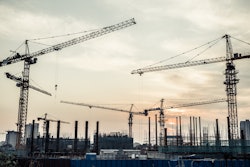The global construction industry is gradually regaining strength, having endured a prolonged period of sluggishness in the wake of the global financial crisis, according to a new study from Timetric’s Construction Intelligence Center (CIC). In real value terms*, the global industry is expected to have reached US$8.5 trillion in 2015, up from US$7.5 trillion in 2010. Over the forecast period (2016-2020) the pace of expansion will accelerate to an annual average of 3.4%, with the industry reaching a value of US$10.0 trillion in 2020.
The emerging world will continue to outperform the advanced economies, but the pace of growth in the former will ease to an annual average of 4.2% over the forecast period from 5.2% during the review period (2011-2015). In 2010, emerging markets accounted for 43.9% of global output, a share that is anticipated to rise to 51.9% by 2020. However, it is the recovery in many of the major advanced economies that will push up the pace of global construction output over the next five years, with the annual rate of expansion in the advanced economies accelerating from an average of 0.1% during the review period to 2.5% over the forecast period.
Asia-Pacific will continue to account for the largest share of the global construction industry, given it includes the large markets of China, Japan and India. However, the pace of growth will slow, given the relative sluggishness in China’s construction industry, the expansion of which will be undermined by the glut of new residential property. The emerging markets of South-East Asia will invest heavily in new infrastructure projects, supported by private investment.
Construction industries in most Western European countries are recovering, but on the whole, output in real terms will remain below the pre-crisis highs. Ongoing troubles in the eurozone and the Russia-Ukraine crisis mean that investor confidence is still fragile. Germany’s construction industry will remain slow-moving, hampered by weak investor confidence and the government’s focus on austerity.
Large-scale investment in infrastructure projects, mostly related to transport, will be a key driving force behind the rapid growth in construction in the Middle East and Africa. Qatar’s industry will remain the fastest growing in the world over the forecast period, with a number of multi-billion infrastructure development projects either planned or underway. The fall in oil prices will put some energy projects at risk, and will weigh heavily on government finances in economies dependent on revenues from the oil and gas sector.
Latin America’s construction industry is anticipated to expand at a slower pace than other emerging market regions, mainly as a result of contraction in Brazil. Economic uncertainty will continue to undermine investor confidence in Argentina, while Venezuela will remain troubled. Mexico’s industry is recovering from a period of weakness, and will be supported by investments in infrastructure and residential projects. Weak copper prices are having an adverse effect on Chile and Peru, and a continuation of this situation could put new metal projects at risk.
*Measured at constant 2010 US$ exchange rates


















